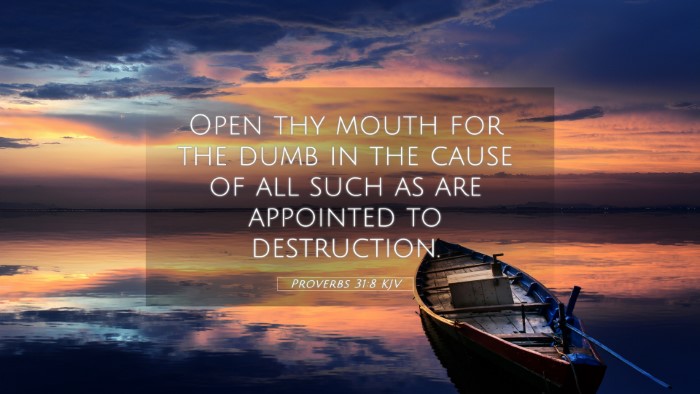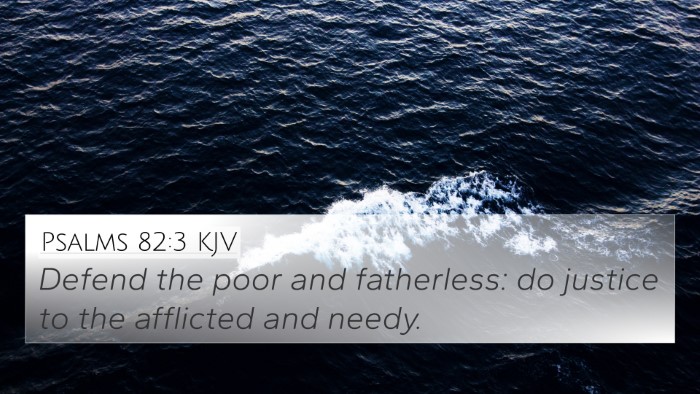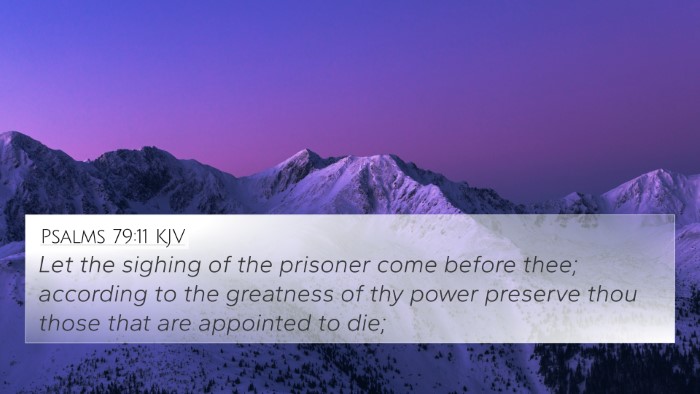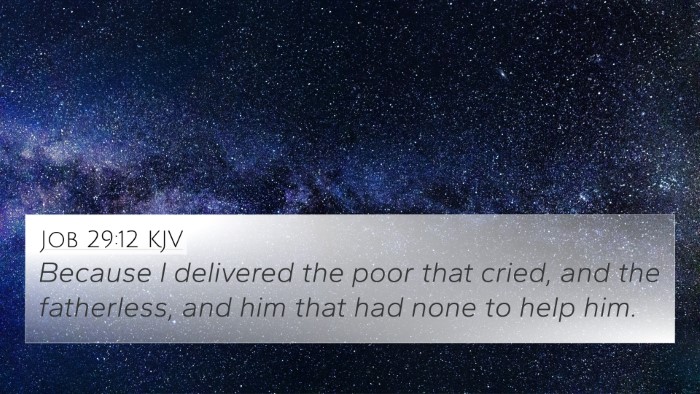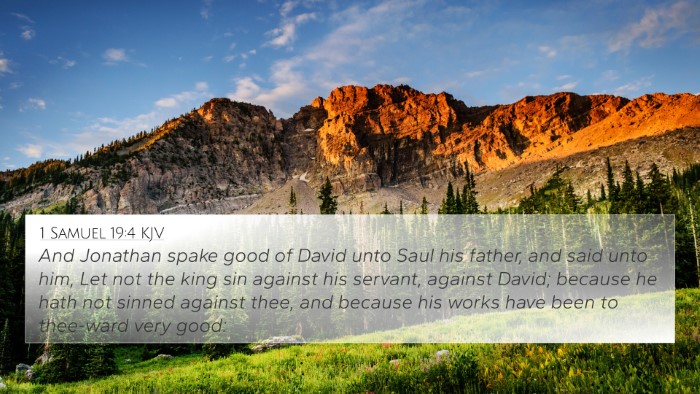Understanding Proverbs 31:8
Proverbs 31:8 states: "Open your mouth for the mute, for the rights of all who are destitute." This verse calls upon individuals to be advocates for those who cannot voice their own struggles and rights, encouraging engagement with social justice and compassion towards the vulnerable in society.
Verse Meaning and Insights
This particular verse is part of a section in Proverbs that emphasizes the characteristics and responsibilities of a virtuous woman, yet its implications are broader, making it relevant for all believers.
Commentary Insights
-
Matthew Henry's Commentary:
Henry emphasizes that the righteous have a duty to speak on behalf of the powerless. The mute symbolizes not only the physically mute but also those oppressed and unable to fight for their rights. By advocating for them, one can exemplify true virtue.
-
Albert Barnes' Notes:
Barnes elaborates on the necessity of defending the needy, highlighting that the absence of voice for the destitute puts them at an even greater disadvantage in society. He notes that such actions are a demonstration of wisdom and righteousness.
-
Adam Clarke's Commentary:
Clarke discusses the social responsibilities implied in the verse. He urges that the act of 'opening the mouth' is not just about speaking but also involves listening and understanding the plight of the oppressed, thus making a comprehensive case for social engagement.
Bible Verse Cross-References
This verse connects with several others that speak to the theme of advocacy and justice:
- Isaiah 1:17 – "Learn to do good; seek justice, correct oppression; bring justice to the fatherless, plead the widow's cause." This verse echoes the call to actively seek justice for the marginalized.
- Psalms 82:3 – "Give justice to the weak and the fatherless; maintain the right of the afflicted and the destitute." Here, the Psalmist affirms our responsibility to ensure justice is served.
- Proverbs 29:7 – "A righteous man knows the rights of the poor; a wicked man does not understand such knowledge." This verse contrasts the understanding of the righteous versus the wicked regarding the plight of the poor.
- Lamentations 3:34-36 – "For he does not afflict from his heart or grieve the children of men. To crush underfoot all the prisoners of the earth, to deny a man his rights before the Most High..." This passage reveals God's disfavor towards injustices and affliction against the helpless.
- James 1:27 – "Religion that is pure and undefiled before God is this: to visit orphans and widows in their affliction..." Emphasizing care for orphans and widows, this verse links to advocacy and compassion.
- Micah 6:8 – "He has told you, O man, what is good; and what does the Lord require of you but to do justice, and to love kindness, and to walk humbly with your God?" Micah succinctly sums up the essential moral duties of believers.
- 1 John 3:17 – "But if anyone has the world's goods and sees his brother in need, yet closes his heart against him, how does God's love abide in him?" This New Testament verse underscores the moral imperative of acting on behalf of those in need.
- Luke 4:18-19 – "The Spirit of the Lord is upon me, because he has anointed me to proclaim good news to the poor..." Jesus cites His mission to advocate for the disenfranchised, effectively connecting His work to the message of Proverbs 31:8.
- Acts 4:34-35 – "There was not a needy person among them, for as many as were owners of lands or houses sold them and brought the proceeds of what was sold..." This verse highlights the early Christian community's commitment to care for each other, strongly resonating with the message of justice and advocacy.
Applications of Proverbs 31:8
As believers today reflect on Proverbs 31:8, it serves as a poignant reminder to bridge the gap between faith and action:
- Advocacy: Be a voice for those who cannot advocate for themselves, whether in societal issues or personal situations.
- Awareness: Cultivate an understanding of the struggles of the marginalized around us.
- Action: Engage actively in helping those in need, whether through community service, charitable giving, or daily acts of kindness.
- Education: Teach others about the importance of advocacy and social justice from a biblical perspective.
Thematic Connections in the Bible
Proverbs 31:8 stands at the crossroads of a multitude of biblical themes:
- Social Justice: Many verses promote the need for social justice, which is a recurrent theme throughout both the Old and New Testaments.
- Caring for the Poor: The Bible consistently emphasizes care for the underprivileged through various narratives.
- Speaking Truth to Power: Advocacy often involves challenging systems that perpetuate injustice, a theme depicted through the lives of many biblical figures.
- Community Responsibility: The responsibility of the community towards its members, especially the weak and helpless, is a persistent theme.
Conclusion
Proverbs 31:8 encapsulates the essence of advocacy and compassion that believers are called to embody. When viewed through the lens of cross-referencing with other biblical texts, the call to action is clear: we are to uplift, defend, and care for those who are vulnerable, echoing the heart of the Gospel. By engaging with this verse and exploring its connections, one can gain a deeper understanding of the biblical mandate for social justice and compassion.

